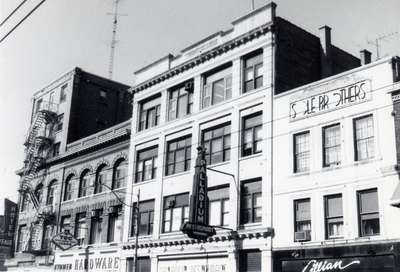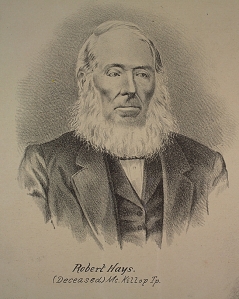Losing Even More History

Image from Kitchener Public Library
The city of Kitchener, is ordering the demolition of the historic Mayfair Hotel because the 110-year-old building poses a public safety risk. Now is it is rumored that the owners of 156-158 [the adjoining buildings] are going to ask Council to withdraw its intention to designate that building too. Whether they want to demolish it, along with 11 Young Street, the Mayfair Hotel, we won’t know till they speak at council.
It seems appropriate to pass on a little history of the people associated with these buildings.
Henry Lippert of the Mayfair Hotel building
http://generations.regionofwaterloo.ca/getperson.php?personID=I179615&tree=generations
EDWARD LIPPERT PASSES AT HOME
Had Active Career As Manufacturer, Merchant, Hotelman, and City Builder
Edward Lippert, 62, former alderman, senior member of the undertaking firm of Lippert and Hunter, and prominent Kitchener businessman, died at his home, 42 College Street, at 8:30 o’clock last evening following an illness that set in early in the year.
Mr. Lippert had been confined to his bed for about two months. Recently and up until yesterday there was a slight improvement in his condition but pneumonia set in. He was communicative and conscious until about 15 minutes before he passed away.
The deceased was elected to the Kitchener City Council at the last municipal election, but owing to his illness he was able to attend only a few meetings. He resigned about two months ago, and was succeeded by C. C. Hahn, former mayor.
Successful in Business
Mr. Lippert’s death means termination of a long and successful business career. The deceased was son of the late George Lippert Sr., founder and head of the former Lippert Furniture Company Ltd. and for many years, chairman of the Kitchener Public Utilities Commission. He was born in Preston but the family subsequently moved to Kitchener where he attended St Mary’s school.
Leaving school at 12 years, he learned the upholstering trade, working in various local shops. Subsequently he was employed in Grand Rapids, Salt Lake City, Utah, and Central City, Colorado. It was while he was working in a Central City furniture and undertaking establishment that he entered his first business venture.
He wanted to quit his job, but the employer induced him to stay by taking him into partnership. This was successful. The second milestone of his business career was becoming financially interested in 1902 in the furniture factory started by his father, the late George Lippert, located on Louisa street.
Mr. Lippert quit the Central City partnership in 1905 when he returned to Kitchener. In that year, he also undertook his first real estate enterprise. He built the first three stories of the block on the northeast corner of King and Young streets at that time and started a retail furniture and undertaking business. He conducted this business at this stand for many years.
His faith in Kitchener and his aggressiveness resulted in him becoming interested in other real estate properties, which he owned or of which he was part owner, up until his death. Mr. Lippert’s real estate purchases were always followed by improvements. It was his policy not to allow his buildings to become dilapidated.
The deceased sold the furniture end of the business in 1920. In the same year he bought the Brunswick House, at the northwest corner of King and Young streets, then an apartment house. He changed the name to the Windsor House and again turned the place into an hotel. after completing refurnishing it.
He operated this hotel until 1924, when he sold it to Charles Bruder, the present owner.
Builds New Block
Following his sale of the Windsor property, he built the block of stores on the north side of King street west between Water and Francis streets, in which he subsequently started up a new retail furniture business and which he later turned over to his sons, Harold and Edward Jr. and to Alexander Reinhart. the present owners. The modern funeral home, Lippert and Hunter, is located in this block He opened the Mayfair Hotel, King and Young streets, where the furniture and undertaking business was formerly located, on Sept. 11, 1929. By coincidence, his death occurred exactly on the sixth anniversary of the day on which he received his first hotel guests.
Before opening this hotel, he put on three more storeys over the three old ones, and had the distinction of being the first owner of a six-storey building in Kitchener.
Active in Texas
Mr. Lippert’s enterprise, however, was not confined to Kitchener, but extended far beyond the city and even out of Canada. In addition to owning Toronto and Calgary properties, he opened an entirely new business section in a Texas town. He built the first row of business buildings in the district, had the street widened and other improvements made.
The deceased, in addition to being an enterprising and aggressive business man, was a citizen interested in his home city. Of late years, he was particularly interested in the improvement of municipal government. He fought for lower taxation and easing of the burden on the taxpayer, and it was largely through this activity that the Kitchener Taxpayers’ Association was organized some years ago and that as a result a public forum from which municipal issues could be discussed was provided. He also believed in the necessity of Kitchener getting new industries.
Elected to Council
During the last municipal election held in December, Mr. Lippert was induced by a number of citizens to stand as a candidate for alderman, and he was returned to office.
Mr. Lippert was a staunch Liberal, and during the 1924 provincial election, took the platform in support of the party and local candidate and the Canadian Woodmen. He was a member of St. Mary’s Roman Catholic Church, St. Boniface Society,
Kitchener Daily Record 12 Sep 1935
The Hymmen Family [Hardware business from 1850-1960]
http://generations.regionofwaterloo.ca/getperson.php?personID=I186267&tree=generations
August and Charles Boehmer in the sixties owned a hardware, stove and tinware store at 58 East King Street. In 1874, they began manufacturing paper boxes, after selling the hardware stock to C. E. Moyer and the tinware shop to Peter and Henry Hymmen. Hymmen Bros. first leased quarters in the Canadian block from J. Y. Shantz, and later on in the Germania block. Hardware and plumbing were added to their lines. In 1892, Peter Hymmen bought his brother’s share. In 1906, he opened up West King Street as a business section, erecting a large block at No. 158. Mr. Hymmen was active until shortly before his death in 1930. Prior to his departure, his sons, H. I.. Hymmen and Homer Hymmen, had been their father’s associates and now direct the enterprise. After Henry Hymmen left the firm he was for four years with H. Wolfhard & Co., and then bought C. E. Moyer’s hardware stock. He carried on in the Dunke block until 1900, when he was appointed superintendent of the waterworks. George Potter, who for many years had been with John Fennell & Son, bought Mr. Hymmen’s stock, and is still doing business at the old stand.
A History of Kitchener, W. V. (Ben) Uttley, Kitchener, Ontario 1937, pg 159
____________________________
Hymmen Bros. & Chamberlain, Hardware, Stoves, Pumps, etc., King Street – The hardware trade in Berlin is one in which a large amount of capital is invested, and in which employment is furnished to many hands. The goods handled are those in use in all building operations, houses, stores, offices, etc., and consequently the demand is large and the field of operations extensive. Among those actively and prominently engaged in this line of industry is the firm of Messrs. Hymmen Bros. & Chamberlain, whose business has been established for the past six years, Mr. Chamberlain having been admitted a partner last spring. The premises occupied are large and commodious, being 20×124 feet in dimensions, where a large and well assorted stock of hardware, stoves, pumps, tinware, hot-air furnaces, cutlery, etc., etc., is carried in profusion. The firm manufacture their own tinware both from order and for stock. They give employment to 8 competent assistants and skilled workmen, and use one team for the delivery of goods to customers, who come from the town and surrounding sections of country. The business since its inception has been constantly improving and still steadily increases, the volume of business transacted this fall being very large and in advance of former years. All members of the firm are natives to Canada, and imbued with all the business characteristics which have made the country such a successful commercial one. They are held in the highest regard by all who know them.
Industries of Canada Historical and Commercial Sketches Hamilton and Environs 1886
_______________
Article now a Bitter pill
Former Mayfair Hotel and Hymmen Hardware in Kitchener’s Centre Block are designated by Kitchener City Council
December 15, 2008
Former Mayfair Hotel and Hymmen Hardware in Kitchener’s Centre Block are designated by Kitchener City Council.
On November 24, a representative of the North Waterloo Region Branch, made a brief presentation to Kitchener City Council in support of Heritage Kitchener’s submission to designate 11 Young Street, the former Mayfair Hotel and 156-158 King Street West (P. Hymmen Hardware). Both buildings have cultural heritage significance. Happily, City Council passed a motion to designate these buildings.
In its statement of cultural heritage value, Heritage Kitchener stated that the exterior condition of both buildings is good. Concerning the former Mayfair Hotel, the report states that the building has an historic association with prominent Kitchener business man Edward Lippert,who in 1905 built a 3 storey structure for his furniture and undertaking business, as well as other buildings in the downtown. Lippert served as a city councilor in the 1930’s. This building is of a Renaissance Revival Style, a relatively common style for commercial buildings of the period; in 1929, three storeys were added in art deco style which was popular in the 1930s. The two styles blend well.
Here is a quote from the report :”contextually, the former Mayfair Hotel makes an important contribution to the downtown streetscape. Apart from the replacement of windows and minor alterations to the façade at street level, the building appears as much as it did in 1929, and adds to the visual and architectural continuity of the historic main street. It was the tallest building (at six storeys) in the downtown following the construction of the 1929 addition and continues to occupy a prominent location on King Street.”
Regarding, the former Hymmen Hardware Building the report states that it “makes an important contribution to the downtown streetscape. Apart from the replacement of windows and minor alterations to the façade at street level, the building appears much as it did in 1909, and adds to the visual and architectural continuity of the historic main street… the façade shares the same construction and architectural detailing as the original three storeys of the former Mayfair Hotel….”
Congratulation to Heritage Kitchener and the Heritage Planning Department for your success!
http://www.arconserv.ca/news_events/show.cfm?id=128 2015


